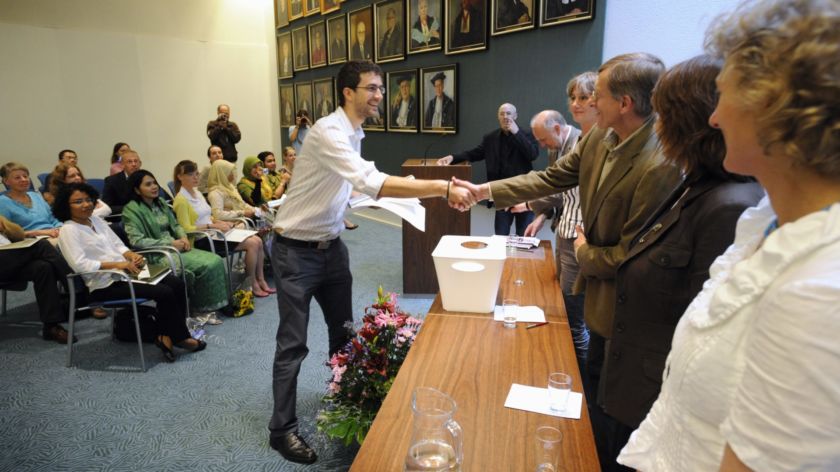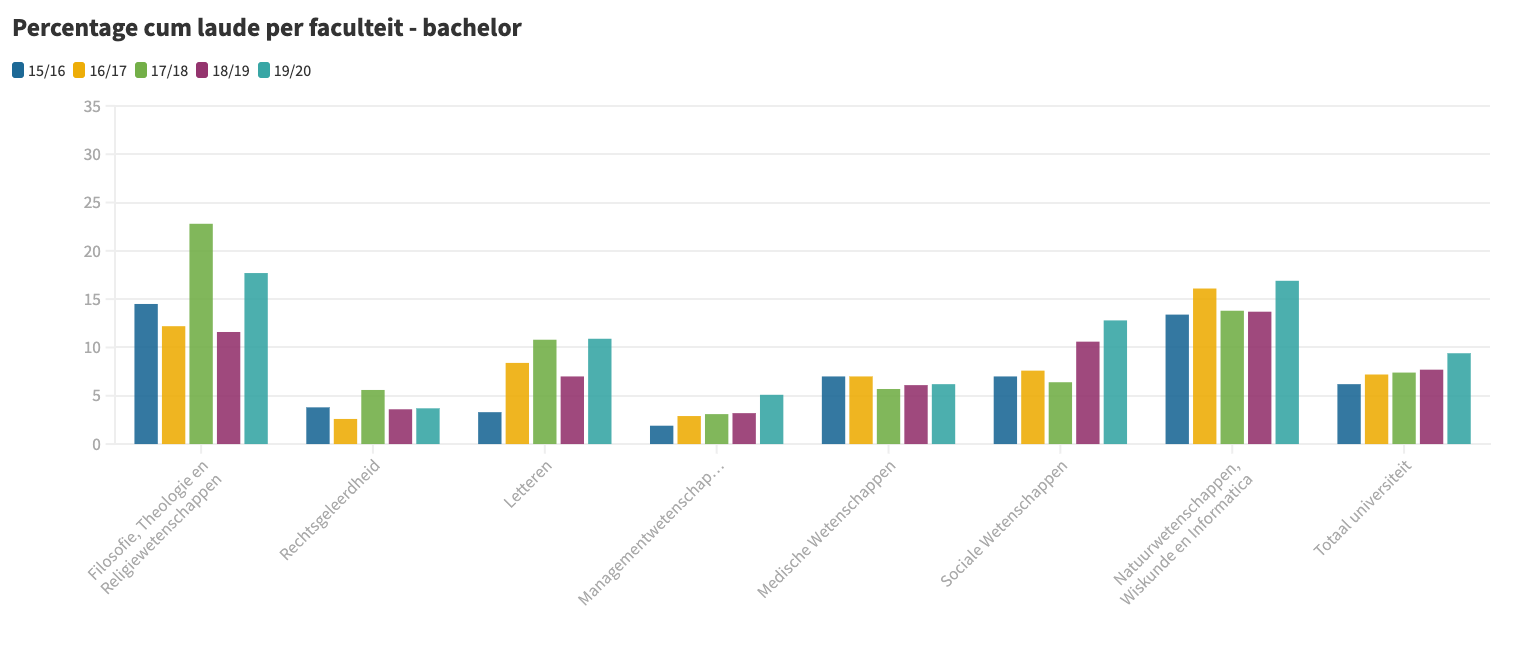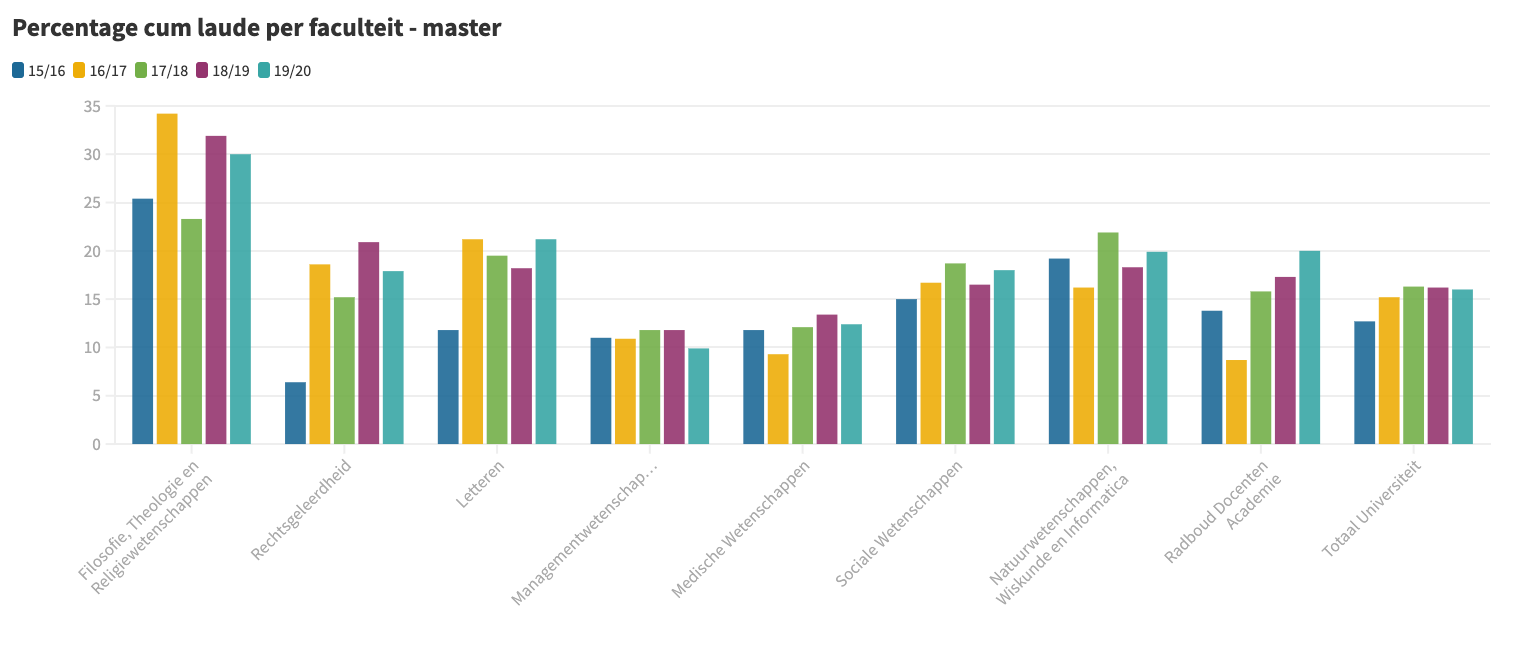Why are philosophers five times more likely to graduate cum laude than law students? Radboud University has no idea
-
 Een maA Master’s graduation ceremony at the Faculty of Arts. Photography: Bert Beelensteruitreiking bij de Faculteit der Letteren. Foto: Bert Beelen
Een maA Master’s graduation ceremony at the Faculty of Arts. Photography: Bert Beelensteruitreiking bij de Faculteit der Letteren. Foto: Bert Beelen
Radboud University figures show that your chances of completing a study programme cum laude depend, among other things, on the faculty where you study. The outlier is the Faculty of Philosophy, Theology and Religious Studies: nearly a third of their Master’s students graduate ‘with honours’. The faculties are clueless as to what causes these differences.
Until 2015 all faculties had their own rules for awarding cum laude. Since then the guidelines have largely been standardised. Students need an average grade of 8 for cum laude and 9 for summa cum laude. They are also only allowed a maximum of 10% of resits.
This fact notwithstanding there are still substantial differences between the faculties, as apparent from data sent to Vox by Radboud University. The most magnanimous faculty (FFTR) awards cum laude five times as often to its Bachelor’s students (17.7%) and three times as often to its Master’s students (30%) than the least generous faculties, i.e. the Faculty of Law for Bachelor’s students (3.7%) and the Nijmegen School of Management for Master’s students (9.9%). The latter also awards relatively few cum laude distinctions to its Bachelor’s students.
Another striking fact is that across the University, Master’s students (16%) are more likely to be awarded cum laude than Bachelor’s students (9.4%). In the Bachelor’s phase the number of students who graduate cum laude has been growing steadily for years: in the academic year 2015-2016 it was still 6.2%. In the Master’s phase the number of students with cum laude has remained stable since 2016-2017. All these figures refer to the academic year 2019-2020 and include summa cum laude distinctions. These are incidentally only rarely awarded: on average less than ten times a year.
Graphic: Flourish
Graphic: Flourish
The data raise the question of what might cause such big differences. There are two obvious possible explanations. It could be that the faculties attract different types of students. Could it be that philosophy students are more intelligent or hard-working than law students? A second possible explanation lies with the faculties themselves. Are the courses they teach easier? Do their lecturers tend to award higher grades? Top scorer FFTR uses a ‘master-apprentice’ model, in which lecturers intensively guide and supervise individual students. Could this close collaboration make the lecturers more inclined to award higher grades?
Faculties
The faculties don’t know the answer, and they don’t wish to speculate. ‘Anything I say about it would be speculation, which I don’t think is appropriate,’ says Director of Education Esther-Mirjam Sent from the Nijmegen School of Management. ‘These intriguing figures require further investigation.’
Director of Education Roel Schutgens from the Faculty of Law also admits to having ‘no idea, other than a speculative one’ why only 3.7% of his Bachelor’s students graduate cum laude. Schutgens points to the fact that law students in the Master’s phase score a little higher than average. ‘These students didn’t suddenly turn into different people, nor did we suddenly become different lecturers. How is it possible? My guess is as good as yours.’
Despite repeated invitations, the FFTR Faculty has refrained from commenting on the figures. University spokesperson Martijn Gerritsen responded by saying that the Executive Board ‘aims to avoid undesirable differences between the faculties.’ Gerritsen informed us that the figures Vox has received will be discussed with the faculties’ Directors of Education. This consultation is expected to take place in June.





